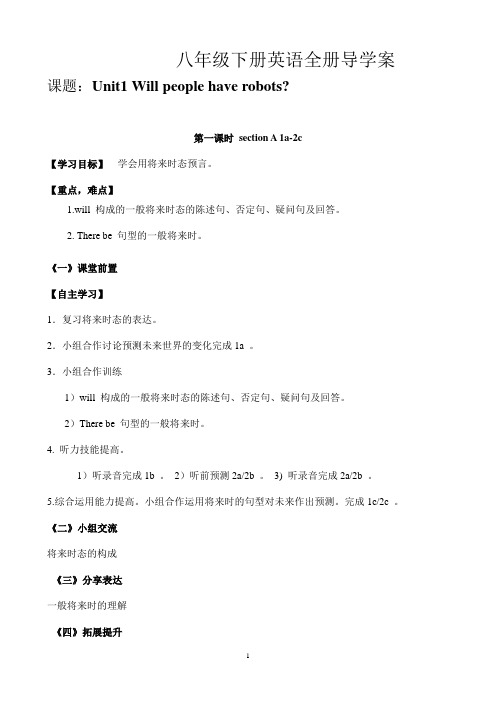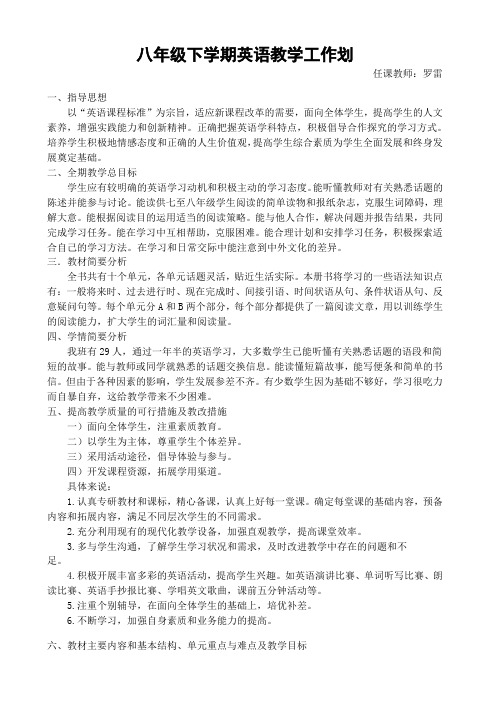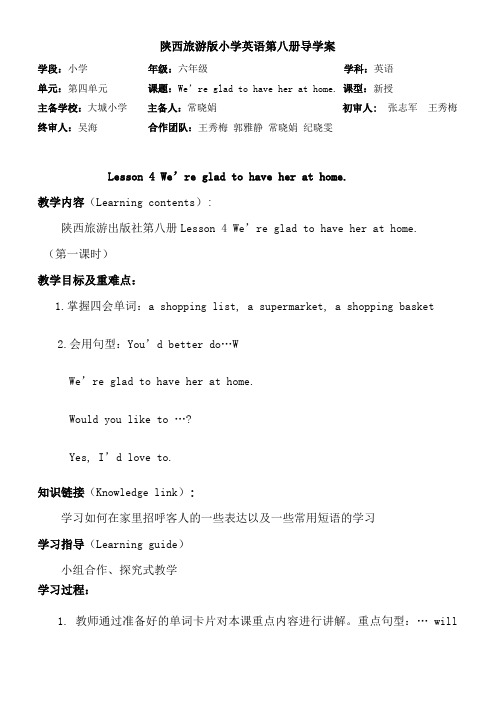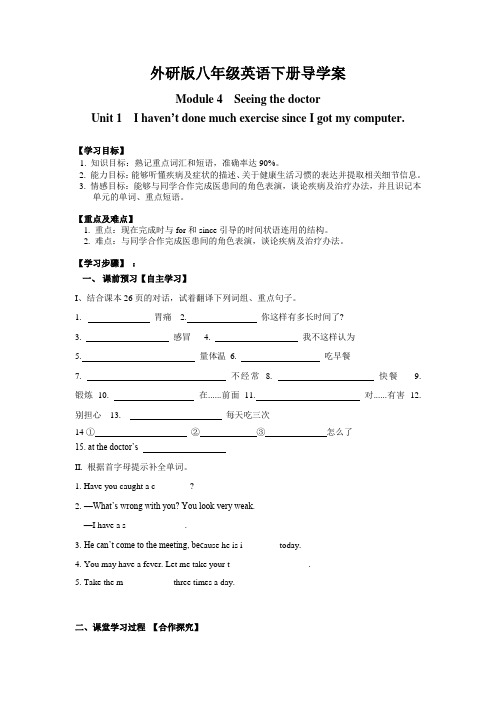八年级下册英语第四单元导学案第一课时
Unit+4+Agood+read++Reading导学案 牛津译林版八年级英语下册

课题译林版八下英语Unit 4 A good read - Reading导学案课型新授时间课时 1 主备人一、学习目标1. Students can understand and master the key words and phrases in the text, such as: against, tired out, tie, tiny, continue, manage, etc.2. Students can understand Gulliver's wonderful experience in Lilliput through reading.3. Cultivate students' reading comprehension ability and language expression ability.二、学习重难点1. 重点Master the key words and sentence patterns in the text.Understand how Gulliver met at Lilliput and the details.2. 难点Be able to describe Gulliver experiences in your own language.Understanding of the complex sentence structure in the text.三、学习方法1. Independent reading: Students should read the text independently in the preview stage and have a preliminary understanding of the story content.2. Group discussion: To discuss the problems and difficulties in the text in the group and solve them together.3. Teacher's explanation: Teachers will explain and answer the key knowledge and students' questions.四、学习过程(一)预习导入(5 分钟)1. 让学生在预习的基础上,尝试回答以下问题:Have you ever read Gulliver's Travels?What do you know about this book?2. 引导学生思考:If you were Gulliver, what would you do in such a strange situation?(二)词汇学习(10 分钟)1. 展示单词:against, tired out, tie, tiny, continue, manage 等。
人教版英语八年级下册导学案

Unit4Section A一、学习目标:1) Important words: mad, anymore, message, suppose, hard-working2) Important phrases: watch soap operas, be supposed to do, first of all, pass on, sth. happen on …3) Important Sentences①She said she was mad at Marcia. ②She said she was having a party for Lana.③What happened on “Young Lives” last night? ④You are supposed to meet at the bus stop to return it.4) Grammar: 直接引语和间接引语二、学法指导:运用任务型学习,驱动学生掌握直接引语与间接引语之间的转化三、学习过程:Step1自学单元语法:(直接引语和间接引语)(一) 直接引语和间接引语的含义:引述别人的话时,一般采用两种形式:一是引用别人的原话,两边用引号标出,称为直接引语;二是用自己的语言转述别人的话,称为间接引语。
间接引语在句中实际上就是宾语从句。
(二) 直接引语变间接引语的方法:1.从句人称的变化:由直接引语变间接引语时,从句的主语人称要遵循一主、二宾、三不变的原则。
1)直接引语的主语是第一人称时,变为间接引语时要和主句的主语保持一致。
2)eg:①They said,“We will go there by bus”。
→They said they would go there by bus.3)②He said,“I am visiting my aunt next week.”→He said that he was visiting his aunt next week.2)如果直接引语的主语是第二人称,变为间接引语时要与主句的宾语保持一致。
最新版八年级下册英语全册导学案(120页)

八年级下册英语全册导学案课题:Unit1 Will people have robots?第一课时section A 1a-2c【学习目标】学会用将来时态预言。
【重点,难点】1.will 构成的一般将来时态的陈述句、否定句、疑问句及回答。
2. There be 句型的一般将来时。
《一》课堂前置【自主学习】1.复习将来时态的表达。
2.小组合作讨论预测未来世界的变化完成1a 。
3.小组合作训练1)will 构成的一般将来时态的陈述句、否定句、疑问句及回答。
2)There be 句型的一般将来时。
4. 听力技能提高。
1)听录音完成1b 。
2)听前预测2a/2b 。
3) 听录音完成2a/2b 。
5.综合运用能力提高。
小组合作运用将来时的句型对未来作出预测。
完成1c/2c 。
《二》小组交流将来时态的构成《三》分享表达一般将来时的理解《四》拓展提升一般将来时的应用【课堂练习】一、根据汉语意思,完成句子。
一空一词。
1. 书籍将会仅仅在电脑,而不在纸上。
Books _____ only _____ on computers, not _____ paper.2. 今后在这座城市将会有更多的树木,更少的污染。
Will _____ _____ trees and _____ pollution in the city in future.3.你认为人们家里将会有机器人吗?Do you will be in people’s homes?4. 他们不会去野营。
我确信他们将来参加我们的聚会。
They _____ go . They _____ come to our party, I’m sure.5.100年后孩子们还要去上学吗?---不,他们将不用上学.------ kids go to school 100 years------ No, they【小结】:今天我学会了新单词:新短语:新句型:第二课时section A 3a-4【学习目标】1.理解并会用句型what do you think …will be in 10 years?预测未来。
八年级英语下册全册导学案

八年级下学期英语教学工作划任课教师:罗雷一、指导思想以“英语课程标准”为宗旨,适应新课程改革的需要,面向全体学生,提高学生的人文素养,增强实践能力和创新精神。
正确把握英语学科特点,积极倡导合作探究的学习方式。
培养学生积极地情感态度和正确的人生价值观,提高学生综合素质为学生全面发展和终身发展奠定基础。
二、全期教学总目标学生应有较明确的英语学习动机和积极主动的学习态度。
能听懂教师对有关熟悉话题的陈述并能参与讨论。
能读供七至八年级学生阅读的简单读物和报纸杂志,克服生词障碍,理解大意。
能根据阅读目的运用适当的阅读策略。
能与他人合作,解决问题并报告结果,共同完成学习任务。
能在学习中互相帮助,克服困难。
能合理计划和安排学习任务,积极探索适合自己的学习方法。
在学习和日常交际中能注意到中外文化的差异。
三.教材简要分析全书共有十个单元,各单元话题灵活,贴近生活实际。
本册书将学习的一些语法知识点有:一般将来时、过去进行时、现在完成时、间接引语、时间状语从句、条件状语从句、反意疑问句等。
每个单元分A和B两个部分,每个部分都提供了一篇阅读文章,用以训练学生的阅读能力,扩大学生的词汇量和阅读量。
四、学情简要分析我班有29人,通过一年半的英语学习,大多数学生已能听懂有关熟悉话题的语段和简短的故事。
能与教师或同学就熟悉的话题交换信息。
能读懂短篇故事,能写便条和简单的书信。
但由于各种因素的影响,学生发展参差不齐。
有少数学生因为基础不够好,学习很吃力而自暴自弃,这给教学带来不少困难。
五、提高教学质量的可行措施及教改措施一)面向全体学生,注重素质教育。
二)以学生为主体,尊重学生个体差异。
三)采用活动途径,倡导体验与参与。
四)开发课程资源,拓展学用渠道。
具体来说:1.认真专研教材和课标,精心备课,认真上好每一堂课。
确定每堂课的基础内容,预备内容和拓展内容,满足不同层次学生的不同需求。
2.充分利用现有的现代化教学设备,加强直观教学,提高课堂效率。
导学案4课

陕西旅游版小学英语第八册导学案学段:小学年级:六年级学科:英语单元:第四单元课题:We’re glad to have her at home. 课型:新授主备学校:大城小学主备人:常晓娟初审人: 张志军王秀梅终审人:吴海合作团队:王秀梅郭雅静常晓娟纪晓雯Lesson 4 We’re glad to have her at home.教学内容(Learning contents):陕西旅游出版社第八册Lesson 4 We’re glad to have her at home.(第一课时)教学目标及重难点:1.掌握四会单词:a shopping list, a supermarket, a shopping basket2.会用句型:You’d better do…WWe’re glad to have her at home.Would you like to …?Yes, I’d love to.知识链接(Knowledge link):学习如何在家里招呼客人的一些表达以及一些常用短语的学习学习指导(Learning guide)小组合作、探究式教学学习过程:1. 教师通过准备好的单词卡片对本课重点内容进行讲解。
重点句型:… willcome to our home tomorrow. We’re glad to have her at home.\ Would you like to …\We’d better… 重点短语: go shopping\ a shopping list\ a supermarket\ a shopping basket1)学习邀请别人做某事和对别人的邀请表示感谢的一般表达方法T: 本节课我们将要学习如何在别人来家造访之前作准备。
For example, John will come to our home tomorrow.这里我们用一般将来时态表示将来要发生的事情。
新外研版八年级英语下册导学案-Module 4-Seeing the doctor(U1-U3)

外研版八年级英语下册导学案Module 4 Seeing the doctorUnit 1 I haven’t done much exercise since I got my computer.【学习目标】1. 知识目标:熟记重点词汇和短语,准确率达90%。
2. 能力目标:能够听懂疾病及症状的描述、关于健康生活习惯的表达并提取相关细节信息。
3. 情感目标:能够与同学合作完成医患间的角色表演,谈论疾病及治疗办法,并且识记本单元的单词、重点短语。
【重点及难点】1. 重点:现在完成时与for和since引导的时间状语连用的结构。
2. 难点:与同学合作完成医患间的角色表演,谈论疾病及治疗办法。
【学习步骤】:一、课前预习【自主学习】I、结合课本26页的对话,试着翻译下列词组、重点句子。
1.胃痛2. 你这样有多长时间了?3. 感冒4. 我不这样认为5. 量体温6. 吃早餐7. 不经常8. 快餐9. 锻炼10. 在......前面11. 对......有害12. 别担心13. 每天吃三次14 ①②③怎么了15. at the doctor’sII. 根据首字母提示补全单词。
1. Have you caught a c________?2.—What’s wrong with you? You look very weak.—I have a s_____________ .3.He can’t come to the meeting, bec ause he is i________ today.4.You may have a fever. Let me take your t__________________.5. Take the m___________ three times a day.二、课堂学习过程【合作探究】Step1 Match the words in the box with the pictures.cough fever headachestomach ache toothacheStep2 Listen and check (√) what’s wrong with Betty and Daming.Betty Damingcoughfeverheadachestomach achetoothacheStep3. Complete the passage with the words in the box.cough fever health stomachache temperatureIt is easy to look after your (1) _______. Just do some exercise, such as running. Do not eat fast food! It may give you a (2) ___________. Most illnesses are not dangerous but when you catch a cold or get a (3) _______, you may also get a (4) _______. This means your (5) ___________ is higher than usual. You must go to the doctor.Step4. Listen and ch eck (√)what’s wrong with Betty and Daming.(Activity 2)Step5. III. Listen and complete the table about Daming.Illness (1) and .How long (2)For about .Why (3)①food and no .②He spendsin front of the .What to do (4)First, stop eating and.Second, get some .Take some a day.Step6. Listen and notice the intonation1. How can I help you?2. How long have been like this?3. Have you caught a cold?4. Do you do any exercise?分析: 英语有两种基本语调:升调和降调。
鲁教版英语(五四制)八年级下册_Unit4_SectionB(2a-2e)精品导学案

wisely /waizli/ adv.明智地;聪明地p.6
overnight adv.一夜之间;在夜间p.6
2、勾划下列短语、句子并读记含义
1、whether or not与否
2、each other互相(两者),one another(三者以上)互相,彼此
Unit4SectionB(2a-2e)精品导学案
【课题】
Unit4How can we become good learners?
SectionB2a-2e
教师复备栏或
学生笔记栏
【学习目标】
1、掌握单词
Abilityn.能力;才能p.6brain /brein/ n.大脑p.6
activeadj.活跃的;积极的p.6attention n.注意;关注p.6
二、自学(自主探究6分钟)
1、拼读单词、记忆汉语
Abilityn.能力;才能p.6brain /brein/ n.大脑p.6
activeadj.活跃的;积极的p.6attention n.注意;关注p.6
pay attention to注意;关注p.6 connect v.(使)连接;与……有联系p.6
2d Findthe following words from the passage in the dictionary. Then write a sentence using each word in the context of the reading.
2e Can you think of other ways to become a successful learner? Discuss with your group and share your ideas with the class.
2020年春人教新目标英语八年级下册Unit4全单元导学案设计(无答案)

2020年春人教新目标英语八年级下册Unit4全单元导学案设计(无答案)2020年春人教新目标英语八年级下册U4 第一课时Section A (1a-1c)课前预习【温故检测】Homework, class , sleep , time, friend, advice, problem .可数名词的有:不可数名词的有:【自学检测】:1. How many __________ (tomato) do you need?2. I have __________(too many, too much) homework to do today .3. My parents allow me __________( hang out ) with my friends.4. I got __________(介词填空)a fight with my best friend.5. Why don’t you __________(go) to sl eep ear lier this evening?点拨升华too muc h. “太多”。
1)修饰动词,放在动词之后。
不要吃太多。
Don’t eat ______ _______2)修饰不可数名词。
妈妈有太多家务要做。
Mom has ______ do.1.allow. “允许,准许”。
_______ housework to1)allow sb to do sth. “允许某人做某事”。
Do your parents allow you _________ (play) computer games?2) allowing doing sth. “允许做某事”他们不允许在这里吸烟。
They don’t allow ________ (smoke) here.3) be allowed to do sth. “被允许做某事”我不被允许外出待到很晚。
I am not allowed _______ (stay) out late.2.get into a fight with sb. 和某人打/吵一架。
- 1、下载文档前请自行甄别文档内容的完整性,平台不提供额外的编辑、内容补充、找答案等附加服务。
- 2、"仅部分预览"的文档,不可在线预览部分如存在完整性等问题,可反馈申请退款(可完整预览的文档不适用该条件!)。
- 3、如文档侵犯您的权益,请联系客服反馈,我们会尽快为您处理(人工客服工作时间:9:00-18:30)。
3.听力:听2a, 2b。完成练习并核对答案。
4.小组合作做2c。
5.分角色表演2d,小组讨论解决疑难问题。
四、点播提升
1、Why don’t you go to sleep earlier this evening?今天晚上为什么不再点睡呢?
用法:Why don’t you ...?意为“为什么不?”表示询问或提出建议,相当于Why not?“Why not+动词+?=Why don’ t you+动词+?例如:
榆林市第一中学分校“三五六”高效课堂导学案八年级下册第四单元
课题
Unit4Whydon'tyou talktoyour parents?
(1a-2d)
课型
听说课
设计人
审核人
备课时间
3.28
使用时间
课时
1
授课人
编号
16
班级
姓名
小组
学习目标
1、新词汇及拓展运用,重点词汇用法及短语动词用法。
2、能够运用所学知识谈论问题和困难。
探究案
二、合作探究
1.合作探究及展示交流热身活动:Talk about some pictures.
2.借助图片引出本节课的生词和句型Why don’t you...? What’s the matter? What’s wrong?和You should / could等句型;
三、展示交流
1.听1b完成练习核对答案并跟读。
Will you please ________(come) here tomorrow?请长你明天来这儿,好吗?
Could you please pick it up?请把它捡起来好吗?
(7)Would you mind (not)+动名词“你(不)介意做某事吗?”“请做某事好吗?”
Would you mind________( wait)in line?请你排队等候穿吗?
3)与某人交谈_______________ 4)太多_______________
5)有足够的睡眠_______________ 6)给某人写信_______________
7)重要的事_______________ 8)成功地发展;解决_______________
9)和...打了一架_______________10)归还____________________
5.通过预习你还有什么不懂的地方吗?
训练案
句型转换。
1.What’s wrong with Jim?(改为同义句)
What’s________ _______with Jim?
2.Why don’t you forget about the unhappy things?(改为同义句)
_________ _________forget about the unhappy things?
3、能给出合理的建议,并做出选择。
重难点
掌握一些谈论遇到的问题和提出建议的句型。
掌握情态动词could和should的用法。
预习案
一、自主学习明确目标
1试读单词,解决语音问题,联系有关旧单词
2查阅下面的短语动词
1)允许某人做某事_______________ 2)课后班_______________
_________ _______you________enough sleep.
5.She made t a big deal.(改为同义句)
________she made me a little angry, it______a big deal.
(1) “What/ How about+名词/代词或v.-ing?”意思是“……乍样?”例如:
What/ How about this pair of shoes ?这双鞋怎么样?
What/ How about ________(play) football?去踢足球怎么样?
(2 ) “Let’s+动词原形.“意思是“让我们一起去做某事吧”。例如:
3.You shouldtalk to her on the phone.(就画线部分提问)
________should I__________?
4.I don’t have enough sleepbecause I often have to study until midnight.(就画线部分提问)
Let’ s _______(go )to a restaurant for dinner.让我们去饭馆吃晚饭吧!
Let’s go out for a walk.我们出去散散步吧!
(3)“Shall I /we........?”意思是“我/我们……好吗?”。例如: _______ _______call
him back?我打电话叫他回来,好吗? _______ _______go home?我们回家好吗?
(4)You’d better(not)+动词原形“意思是“你最好(不)做……”。例如:
You’d better ____ ______(not watch) TV when you’re doing your homework.你做家庭作业时,最好不要看电视。
教师复备和学生笔记栏
课后反思
,
(5)Would you like sth./to do sth.“…怎么样”? Would you like a cup of tea?来一杯茶怎么样?
Would you like _________( have) a rest?休息一下怎么样?
(6)Will /Could/ Would you please+(not)动词原形……?它的意思是“请你…好吗?”如:
Why not write to him? =_______ ______you write to him?为什么不给他写信呢?
Why don’t you get up a little early?= _____ ______ get up early?为什么不早一点起床?
2、用来向对方提出建议或意见的常见句型:
